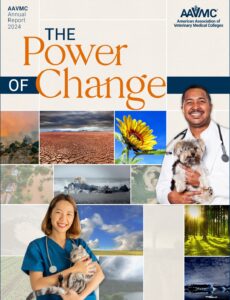Washington, D.C., March 31, 2020 – The American Association of Veterinary Medical Colleges’ (AAVMC) Council on International Veterinary Medical Education (CIVME) has funded four program grants designed to foster the enrichment and advancement of international academic veterinary medicine.
This year’s program included funding the first MSD Animal Health CIVME Antimicrobial Stewardship Grant. This newly established program is the result of a recent collaboration with MSD Animal Health that seeks to improve instructional programs related to antimicrobial resistance in educational institutions around the world.
Nine applications for the inaugural grant of $10,000 were reviewed by CIVME officials. The funded project was “Antimicrobial Stewardship Cooperative,” which was submitted by Laura Hardefeldt of the University of Melbourne in collaboration with Kirsten Bailey and Glenn Browning of the University of Melbourne, and Scott Weese of the University of Guelph.
This year, 22 proposals representing collaborative efforts from around the world were reviewed during the traditional educational microgrant funding process that began when CIVME was established in 2016.
Funded programs and principle investigators include:
- “Appalachia to East Africa: Improving Veterinary Student Outcomes Through Teacher Training,” submitted by Jamie Stewart of Virginia Tech in collaboration with Cassidy Rist and Jennifer Hodgson, Virginia-Maryland College of Veterinary Medicine; Misty Bailey, India Lane and Marcy Souza, University of Tennessee; Julie Hunt and Katherine Fogelberg, Lincoln Memorial University; Samuel Majalija, Makerere, Uganda; Jane Mburu, Egerton, Kenya; and A. Muhairwa, Sokoine, Tanzania.
- “What Makes a Curriculum Leader in Veterinary Education?” submitted by Sheena Warman of the University of Bristol and Elizabeth Armitage-Chan of the Royal Veterinary College in London in collaboration with Katy Cobb, University of Nottingham; Heidi Janicke, St. George’s University; Emma Read, The Ohio State University; Mario Baratta, University of Turin; and Sarah Kelly; University of Bristol.
- “Capacity Building in Veterinary Educational Research by Developing an Open Access Resource to Support Community Members,” submitted by Julie Hunt of Lincoln Memorial University in collaboration with Sarah Baillie of the University of Bristol; Mirja Ruohoniemi, University of Helsinki; Waraporn Aumarm, Bangkok University; Manuel Boller, University of Melbourne; and Victoria Philips, Society for the Protection of Animals Abroad.
CIVME was founded in 2016 to help advance AAVMC interests in elevating the quality of international academic veterinary medicine. Specifically, the charge from the AAVMC Board of Directors was to “advance high-quality veterinary education internationally through enabling and empowering best practice.” CIVME seeks to advance their initiatives by promoting inter-regional collaboration.
CIVME addresses that through:
- Communication and collaboration that advances veterinary medical education around the world
- Facilitating collaboration among educational researchers
- Disseminating innovations and other educational advances to educators and institutions to magnify the impact of projects
CIVME comprises representatives from eight major global regions (Australasia, North America, Central/South America, Continental Europe, UK/Ireland, Middle East, Africa and Asia).
About the AAVMC
The member institutions of the American Association of Veterinary Medical Colleges (AAVMC) promote and protect the health and wellbeing of people, animals and the environment by advancing the profession of veterinary medicine and preparing new generations of veterinarians to meet the evolving needs of a changing world. Founded in 1966, the AAVMC represents more than 40,000 faculty, staff and students across the global academic veterinary medical community. Our member institutions include 53 Council on Education (COE) accredited veterinary medical colleges and schools in the United States, Canada, Mexico, the Caribbean, the United Kingdom, Europe, Asia, Australia, and New Zealand; 23 provisional and collaborating members; and departments of veterinary science and departments of comparative medicine in the U.S.
– 30 –





SHARE